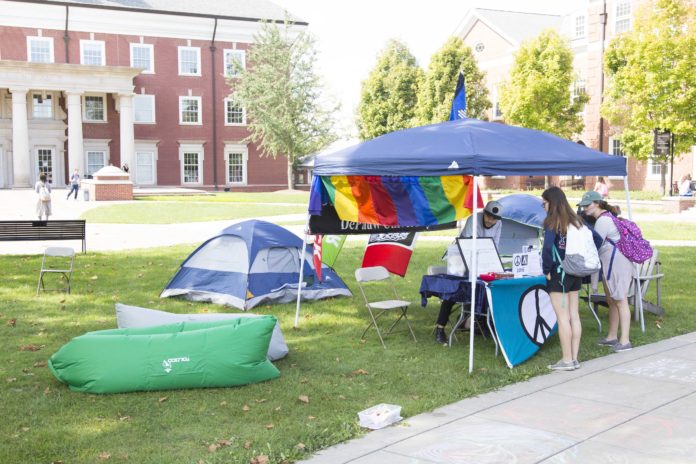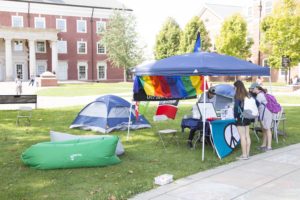

The tents are up, flags are out, and sidewalks in the academic quad are covered in rainbow chalk. Peace Camp 2016 is in full swing.
Peace Camp is an annual event put on by the Compton Center for Peace and Justice and includes multiple programs throughout the week, some of which are co-sponsored by the Prindle Institute of Ethics. The programs are put on by students and faculty and include talks, open discussions, coloring, tie-dying and, as the name would suggest, camping.
Students and faculty will sit under the tents at every hour of the day throughout this week to discuss the purpose of Peace Camp and attempt to get students involved in these discussions on peace, justice and equality. Some students even choose to spend the night in the tents, but that is not a requirement of participants.
This year, there is a major focus on students’ mental health. Val Rudolph, a coordinator for the Compton Center, was pleased to see this kind of focus this year.
“I think we have realized we can’t keep doing what we are doing without taking care of ourselves,” Rudolph said. “It feels like we are finally taking the time for these things on a campus that doesn’t have a lot of time.”
New this year, Peace Camp has a “Healing Tent,” which includes coloring and chalk art as an outlet for students to take that time and do something creative.
Compton Center Student Interns are putting on different events throughout the week as well. Their discussions range from mental health issues in the lesbian, gay, bisexual, transgender and queer/questioning (LGBTQ+) community to gender, race and class in the 2016 presidential election.
To kick things off, junior interns, Laura Harmon and Saige Huiet, moderated a discussion on self-love within the LGBTQ community on Monday night at 5:30 p.m. in the academic quad.
In a circle of chairs filled with LGBTQ members and allies, the discussion began with statistics about mental health on college campuses.
According to Harmon, studies have found that students who identify as gay, lesbian or questioning are more likely to experience depression or anxiety than straight students. The statistics are even higher for bisexuals and furthermore transgender students.
“We looked into research and realized we should include these statistics in the event, but then also wanted to raise a format that was more community-based,” Harmon said.
Huiet then dove into the types of things LGBTQ students at DePauw could do to strengthen their mental health.
Her suggestions included getting creative by doing things like drawing and writing, finding a community, and remembering that you come first. She suggested doing things like yoga or even eating a little chocolate every now and again as she passed out KitKats, cookies and condoms.
They then began asking the audience questions about what could be improved on DePauw’s campus as far as inclusion and mental health were concerned.
The Rainbow House events, United DePauw and the Cultural Resource Center were all mentioned as ways of finding a community on campus, but some members of the circle saw gaps in the community.
Concerns about intersectionality were brought up, with people feeling like they had to leave many of their identities at the door when it came to queer events and discussions on campus, particularly pertaining to how one’s race and background fits in with their queerness.
“I was very glad the topic of intersectionality came up in our talk because it is an issue that definitely needs to be discussed more and incorporated more in these discussions,” Harmon said.
Huiet was also satisfied that the talk went in that direction. “This discussion provided a nice building block to discuss more aspects of self-love and intersectionality in the future,” Huiet said.
Once the discussion was over, Harmon and Huiet asked those in attendance to grab some chalk and draw what it is they love about themselves and their identities on the sidewalks.
“It is empowering to see that people are passionate about themselves and see that come out in a creative way,” Huiet said as people drew rainbows and quotes on the concrete around her.
Peace Camp will continue from now until Friday.
